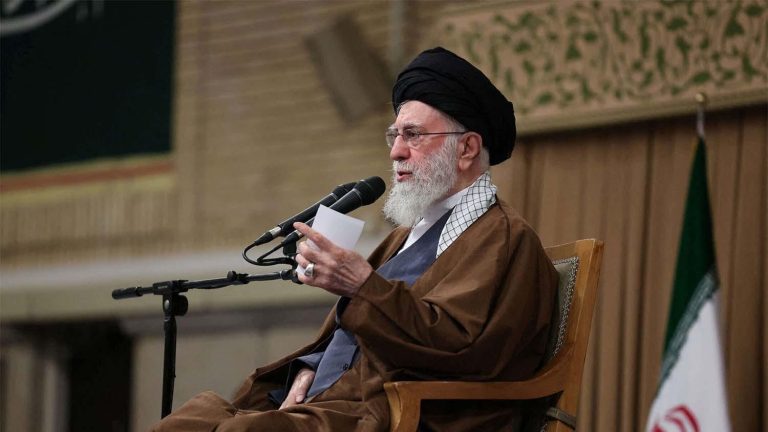In a statement that has already sent shockwaves across global diplomatic circles, Iran’s Supreme Leader Ayatollah Ali Khamenei declared that Iran will only cooperate with the United States once it stops supporting Israel. The remarks, made during a televised speech to senior Iranian officials in Tehran, underline the widening gulf between Washington and Tehran over regional politics, particularly the ongoing crisis in the Middle East.
Iran’s Supreme Leader Ayatollah Ali Khamenei speaks during a meeting with students in Tehran, Iran, November 3, 2025. Office of the Iranian Supreme Leader/WANA (West Asia News Agency) Cc: REUTERS
A Firm Stand Against U.S. Policy
Ayatollah Khamenei’s message was clear and uncompromising. He stated that Iran will not engage in any form of collaboration with the United States as long as Washington continues to provide political, financial, and military support to Israel. This position reflects Iran’s longstanding view that U.S. backing of Israel fuels instability across the region, particularly in Gaza and the broader Palestinian territories.
The Supreme Leader’s remarks come amid heightened tensions following renewed clashes between Israeli forces and resistance groups supported by Iran. Tehran has consistently framed its foreign policy around opposition to Israel’s actions in Gaza and the West Bank, viewing itself as the defender of the Palestinian cause. By conditioning future cooperation on Washington’s stance toward Israel, Iran has drawn a firm red line in diplomatic negotiations.
The Historical Context
The relationship between Iran and the United States has been deeply strained since the 1979 Islamic Revolution, when Tehran cut ties with Washington following the overthrow of the Shah and the U.S. embassy hostage crisis. Since then, decades of mistrust, sanctions, and proxy conflicts have defined their relationship.
Although there have been occasional attempts at rapprochement — such as the 2015 Joint Comprehensive Plan of Action (JCPOA), known as the Iran nuclear deal — progress has repeatedly unraveled. The U.S. withdrawal from the JCPOA in 2018 under the Trump administration reignited tensions and led to renewed economic sanctions that have crippled Iran’s economy.
Iran’s current position suggests that even under potential diplomatic openings, collaboration will not resume unless the United States revises its Middle East policy, particularly its unwavering alliance with Israel.
Linking Diplomacy to the Palestinian Cause
Khamenei’s remarks place the Palestinian issue at the center of Iran’s foreign policy once again. For decades, Tehran has maintained that defending Palestine is a religious and moral obligation. The Supreme Leader’s latest comments align with his repeated calls for the “liberation of Palestine” and his refusal to accept any normalization between Arab nations and Israel.
By connecting Iran’s cooperation with the U.S. to Washington’s support for Israel, Khamenei has reframed Iran’s diplomatic stance into a moral and ideological struggle. This approach resonates with Iran’s allies and partners across the region, including Hezbollah in Lebanon, the Houthis in Yemen, and certain political factions in Iraq and Syria.
The statement also comes as several Middle Eastern nations are reassessing their relationships with Israel. Some, like Saudi Arabia, have delayed normalization talks following recent conflicts in Gaza. Tehran’s hardline position could further polarize the region and strengthen Iran’s appeal among groups opposed to Israeli policies.
Implications for U.S.-Iran Relations
The statement presents a serious obstacle to any potential thaw in U.S.-Iran relations. Despite occasional diplomatic backchannels through intermediaries like Qatar and Oman, this announcement indicates that Tehran is not seeking engagement under the current geopolitical conditions.
For Washington, this poses a challenge. The United States has sought to contain Iran’s influence in the Middle East while managing energy stability and regional alliances. Any improvement in relations now hinges on a major shift in U.S. foreign policy — a prospect that appears highly unlikely given the bipartisan consensus in support of Israel.
Khamenei’s remarks also come at a time when the Biden administration faces domestic political pressure over its handling of the Gaza crisis. Iran’s statement could complicate U.S. efforts to balance its support for Israel with its diplomatic goals in the region, including preventing further escalation with Tehran.
Regional Reaction and Global Response
Across the region, reactions to the Supreme Leader’s statement have been divided. Pro-Iran groups have praised the remarks as a reaffirmation of Iran’s moral stance against what they view as Western hypocrisy. In Lebanon, Hezbollah officials described the statement as a “truthful and necessary message” to Washington.
Conversely, Western allies in Europe have expressed concern that such rhetoric could derail ongoing diplomatic efforts to stabilize the region. Analysts in Brussels and London warn that Iran’s position could make future nuclear negotiations more difficult, as it intertwines political and ideological demands with practical policy issues.
Russia and China, both strategic partners of Iran, are likely to view this statement favorably. Moscow and Beijing have consistently supported Tehran’s position that the U.S. and its allies bear responsibility for destabilizing the Middle East. Both nations may see the declaration as an opportunity to strengthen their own ties with Iran through trade, energy cooperation, and defense partnerships.
A Strategic Message to the World
Beyond its immediate diplomatic implications, Khamenei’s statement serves a broader purpose: asserting Iran’s independence and resistance against Western influence. For decades, Tehran’s foreign policy has been built on the concept of “Neither East nor West — only the Islamic Republic.” By setting strict conditions for any engagement with the U.S., Iran reinforces its image as a sovereign power that refuses to compromise on core principles.
The Supreme Leader’s tone also suggests that Tehran believes it holds significant leverage in the current geopolitical environment. With ongoing conflicts in the Middle East, rising energy prices, and shifting alliances, Iran sees itself as a central actor capable of shaping regional outcomes.
This statement may also serve to rally domestic support. Amid economic struggles and social challenges, a firm anti-U.S. position can strengthen national unity and deflect attention from internal issues. By emphasizing resistance against Western pressure, Khamenei is reaffirming the revolutionary ideals that continue to define Iran’s political identity.
The Path Forward
Looking ahead, Iran’s relationship with the U.S. appears more uncertain than ever. While both countries may continue indirect talks on nuclear and regional issues, meaningful cooperation is unlikely unless Washington changes its approach to Israel.
This hardline position is consistent with Iran’s broader foreign policy philosophy. It signals to allies and adversaries alike that Tehran will not compromise its principles for political convenience. The message is clear: Iran’s cooperation cannot be bought with economic incentives or temporary agreements — it requires a complete reorientation of U.S. policy in the Middle East.
For the international community, this development underscores the complexity of achieving lasting peace in the region. As global powers navigate shifting alliances, Iran’s firm stance adds another layer of tension to an already volatile geopolitical landscape.
Conclusion
The declaration by Iran’s Supreme Leader Ayatollah Ali Khamenei that Iran will only cooperate with the United States once it ends support for Israel represents a defining moment in Middle Eastern diplomacy. It reaffirms Iran’s ideological commitment to the Palestinian cause and signals continued resistance to Western influence.
This statement may further isolate Iran diplomatically but will likely strengthen its position among regional allies who share its opposition to Israel’s policies. The world now watches to see whether Washington will adjust its strategy or whether this deep divide will continue to shape the political future of the Middle East.



















